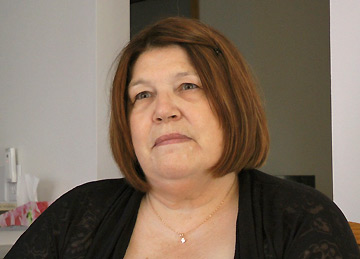Val

Cared for her husband
Age at interview: 58
Age at start of caregiving: 52
Val is 58 years old and has two grown children. She took care of her husband for six years, until he recently passed away. During her caregiving years Val continued to work part-time as a medical transcriptionist. Val’s husband, Dave, was 54 years old when he was diagnosed with motor neuron disease (ALS); he needed increasingly more care during the six years of his illness.
Val’s caregiving role started when her husband began to have trouble breathing. The symptoms were so severe that the only way he could sleep was to sit at the kitchen table and try to breathe. Yet the specialists were unable to detect the origin of his severe symptoms. Six months after the onset of the breathing problems, Dave’s aunt warned Val that her husband was dying and that her best possible option was to go to a Mayo clinic. Within six days, Val had booked an appointment, seen a physician, and had a diagnosis.
Val and her husband lived in a rural area half an hour out of town. Dave received homecare provided by professional health services personnel every other morning as well as one day a week in order to provide some respite for Val. Val felt that the care was excellent and the staff seemed more like their own family than anything else. Nevertheless, when the illness progressed, the couple realized that they needed to reduce the time spent working so they moved to a condo closer to the city.
Although Val had been promised similar health care services in their new location, Dave only received homecare for 15 minutes a day which was certainly not enough. Desperate for more support, Val spent a whole night at her kitchen table writing and sending three e-mails: to the minister of Health, a member of parliament, and a parliamentary healthcare critic. The next morning Val and her husband could not believe what was happening to them: there were seven vehicles in their driveway with six nurses from different care organizations. The letters seemed to have had an impact! Once Dave’s illness had progressed to the point that he was fully paralysed, Val decided that she needed to write some more letters to request overnight help. With her skills as an advocate, she managed to receive overnight staff several days a week.
Val continued to stand by her husband’s side to help him through his difficult illness. Even though Dave was severely ill, he never fully accepted his condition and was in constant denial, making the situation more challenging for Val. Over her entire time as a caregiver, Val had several moments in which she considered suicide. She often felt depressed, was admitted to the psychiatry unit with stress related to her caregiving role and she gained 60 pounds.
She would have really appreciated information about what to expect when the moment came for her husband to die; this was a constant worry for her. Dave passed away unexpectedly and peacefully, the way he wanted it to happen, on Father’s Day. The morning after Dave passed away, Val and her son woke up feeling that a big load had been removed from their shoulders. A healing process then started with Val taking the time to sleep and recover from years of stress. She began to rebuild her life after learning that she was capable of doing much more that she had ever expected.
More content
- When care changes over time – ValVal was relieved when her husband passed away. For her, the grieving had started a long time before his death.
- Impact on health – ValVal describes how it felt to be so stressed.
- Home care and live-in caregivers – ValAlthough Val is very satisfied with the homecare services, last minute cancellations can leave her in a difficult position.
- Effects of care recipients’ behaviour – ValVal thinks her husband was in denial. He never understood how much work it took to care for him.
- Challenging emotions and feelings – ValSome days are a big struggle, and others are filled with joy. For Val, all these feelings are normal.
- Becoming a caregiver – ValAs a last resort, Val brought her husband to a private U.S. clinic to get a diagnosis